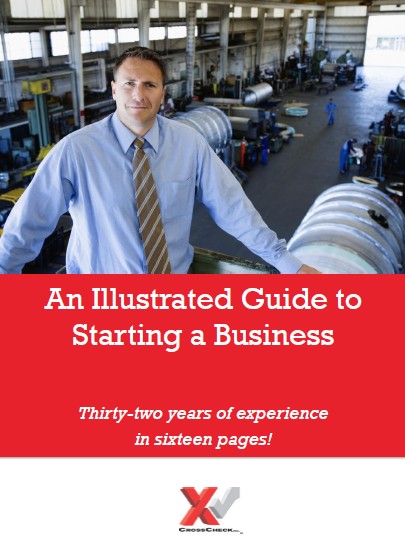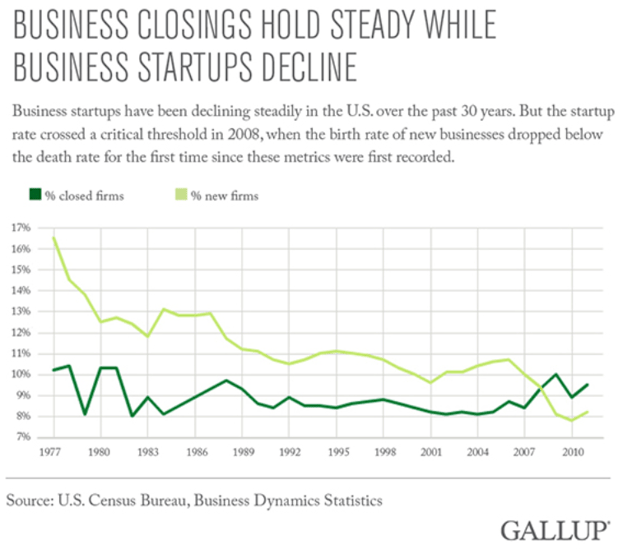 Thinking of starting a business? You’re an American hero.
Thinking of starting a business? You’re an American hero.
Entrepreneurs like you start 543,000 each month, and there are almost 28 million small businesses in the United States today – half again as many as there were thirty years ago (U.S. Small Business Administration).
They provide 55% of all jobs, adding 8 million of them since 1990. They occupy around half of all commercial space.
But as any investor will tell you, past performance is no guarantee of future success. Despite these remarkable achievements, today the entrepreneur is an endangered species.
If you’re stepping up, we want to help.
A Dying Breed
First, we hope the little-known considerations we cover in our latest guide, The Illustrated Guide to Starting a Business, will make you profitable sooner.
And we want to encourage you to stay the course because the country needs you.
Right up to the beginning of the Great Recession American entrepreneurs not only replaced all the businesses that went under in a given year, they also created another 100,000.
The Great Recession reversed that. For the first time since we started tracking it in the 1970s, entrepreneurship is declining. This year we’re 70,000 businesses short of just breaking even.

This is especially alarming because the portion of the population between the ages of twenty-five and fifty-five has been expanding. People in that age bracket start the vast majority of businesses, but even though there are more of them, they aren’t doing it.
Fewer businesses means fewer jobs. New companies created 5.4 million jobs in the year that ended in June 2014. Sounds good, but in the 2000s, they added 6 million a year. In the 1990s, they added 7 million a year.
We need more jobs just as entrepreneurs create fewer of them. The reason is not hard to deduce.
A study by the Kaufman Foundation concluded that the recession “dealt a permanent blow to Millennials’ entrepreneurial potential.”
They couldn’t buy homes, an asset that entrepreneurs commonly use as collateral for their start-up capital. And they are saddled with an “ever-growing mountain of student debt that has left many…without the savings they might have had to put toward a business venture.”
They’re also adverse to risk, which shouldn’t come as a surprise, given all they’ve been through. A study by UBS found that even if a Millennial is lucky enough to be one who can invest, he keeps 52% of his portfolio in cash.
Succeeding Anyway
So whatever inspired you to buck the trend and strike out on the American Dream, we hope you stay confident.
And to help you get there, it’s important to know that all sorts of people doing all sorts of things succeed as entrepreneurs.
You don’t have to be extroverted and you don’t have to be commanding – although those are the types of entrepreneurs we tend to hear about most. In fact, introverted people might be more psychologically stable through the harrowing stresses of a business’ first few years, giving them an edge to succeed.
You don’t have to be young. Time Magazine did a study of self-made billionaires and 70% of didn’t even have the idea that led to their outsized success until they were in their thirties. A quarter of them didn’t make their fortune until they were over forty.
You don’t have to be a programmer. CrossCheck is headquartered in Northern California, where Silicon Valley seems to dominate almost everyone’s imagination. But fewer than one in five self-made billionaires was involved in tech. They were in oil and gas, apparel, food and beverages, publishing, printing, real estate development, entertainment, hotels, and other “normal” businesses.
You don’t even have to be original, further undermining the popular “invent an app, become a zillionaire” belief. More than four out of five self-made billionaires made their fortune in a “red ocean” – a highly competitive, shark-infested market where they were the best, not the first.
You don’t have to be an overnight success, either. Most of the billionaires reached extreme success only after spending years in that red ocean, proving that perseverance is at least as important as hard, smart work.
And finally, you don’t have to be a jerk. Steve Jobs and Elon Musk aside, a lot of nice guys have finished first. How can you tell? Check out the Giving Pledge – most of the self-made billionaires Time studied have publically committed to dedicating the majority of their wealth to philanthropy.
Getting Off to a Strong Start
Business coaches offer a lot of advice, some of it conflicting, but they generally agree on this: Get going now. Tell everyone you know what you’re up to, and ask them to send you people whose experience, ideas or connections might be able to help.
They say that if you jump into that red ocean right away, you’ll start learning what you really need to know to meet your customer’s needs and to create a profitable business.
Of course, you have to have a plan and you have to know how to give yourself an edge.
That’s where we might be able to make a contribution.
Click the image below to download An llustrated Guide to Starting a Business. We’ve been helping entrepreneurs like you for over 30 years, and we look forward to taking some of the risk out of your business and to giving you tools you can use to close more sales.



